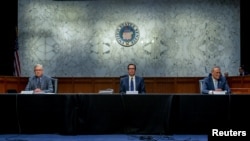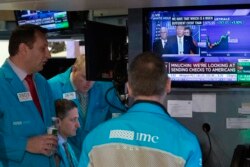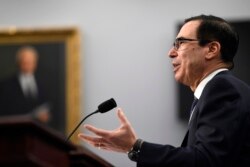The U.S. Senate will vote again Monday on a massive $1.8 trillion economic aid package that would send money to most Americans and many businesses severely impacted by the deadly coronavirus.
The measure failed to advance Sunday, but Majority Leader Mitch McConnell said unless an agreement is reached with Democrats who opposed some of the bill’s contents, lawmakers will hold another vote Monday morning.
The aid package is aimed at boosting the U.S. economy by sending direct payments to more than 90% of Americans and a vast array of U.S. businesses to help them weather the immediate and burgeoning economic effects of the coronavirus.
Democrats say the measure gives too many benefits to corporations, and instead they want more federal money for community health centers, nursing homes, masks, ventilators, personal protective equipment and aid to state and local governments to battle the COVID-19 pandemic.
The bill’s failure to pass Sunday’s procedural vote sent lawmakers back to additional negotiations while U.S. futures markets tumbled.
Wall Street is coming off its worst week since 2008 and investors are looking to Congress and this rescue package to stem the losses.
House Speaker Nancy Pelosi said Sunday that House Democrats are finalizing their own version of an economic rescue package that “recognizes the gravity of the coronavirus challenge” and is a “big difference” from the bill backed by Senate Republicans. The two chambers will eventually have to reconcile their proposals.
Senate Majority Leader Mitch McConnell lashed out at the Democrats.
"If we aren't able to act tomorrow, it will be because of our colleagues on the other side continuing to dicker when the country expects us to come together and address this problem," he said.
His Democratic counterpart, Sen. Chuck Schumer, said the problems with the bill could be overcome and that talks continue, including with Treasury Secretary Steven Mnuchin.
“Our caucus is united in trying to deliver a bill that addresses this health and economic crisis quickly and we’re committed to working in a bipartisan way to get it done, both sides of the aisle voting for a bill,” Schumer said.
Among other elements, the lawmakers were at odds over a $425 billion pool of money for loans and loan guarantees that Republicans want to create, which some opposition Democrats have labeled as a “slush fund” because they believe the Treasury Department would have too much discretion in deciding who receives the money.
Congress had hoped to send Trump the legislation by midweek, but it was not clear whether the stalemated talks would affect that timetable.
Even as the lawmakers talked, Sen. Rand Paul of Kentucky, an ophthalmologist by profession, announced that he had contracted the coronavirus, the first senator and the third member of Congress to test positive.
Two other senators who had contact with Paul – Mitt Romney and Mike Lee, both of Utah – announced they are in self-quarantine.
Aside from the obvious impact of the public health crisis, perhaps 2 million or more U.S. citizens have been laid off from work as thousands of schools, major businesses and such community enterprises as gyms, restaurants, bars and stores have shut their doors, either voluntarily or under state and local government orders.
Governors in seven states – New York, New Jersey and Connecticut in the East, Illinois and Ohio in the U.S. heartland, Louisiana in the South, and California on the Pacific Coast – have ordered millions of people to stay home, in effect quarantined to prevent the spread of the coronavirus.
The toll from the coronavirus is mounting in the U.S., with about 34,000 confirmed cases and 450 deaths.






